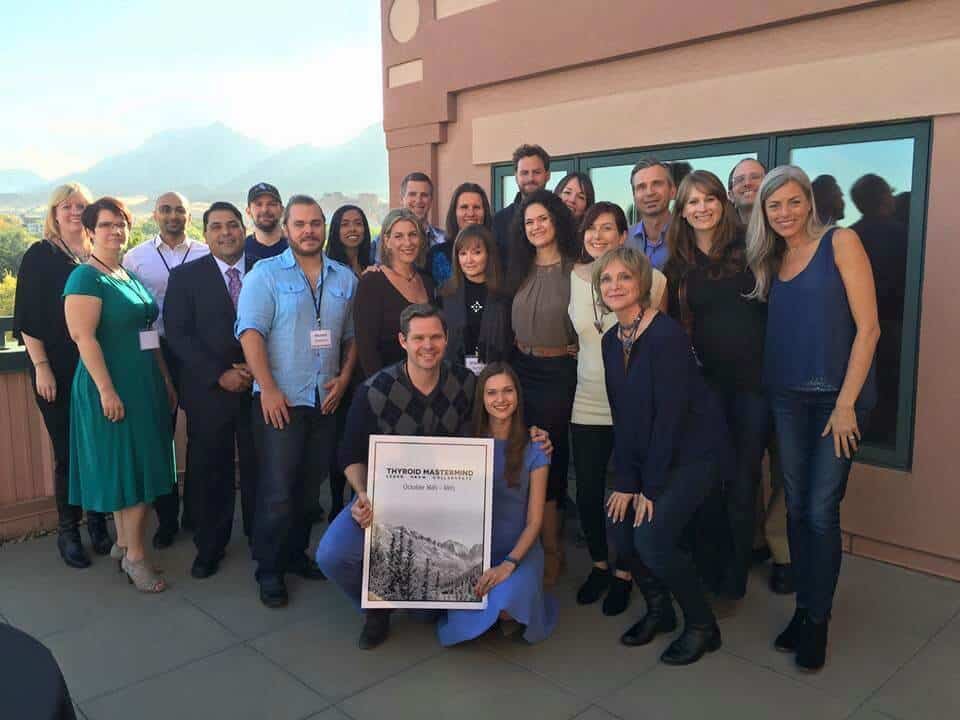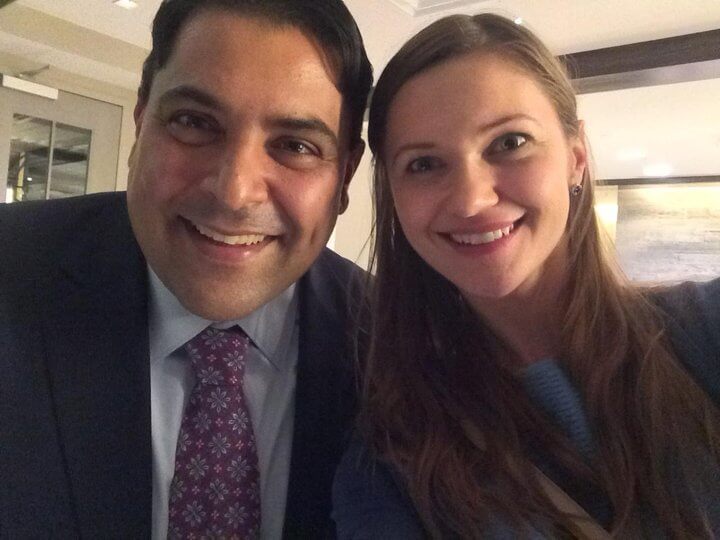Boulder, CO

Thyroid Mastermind
I decided to host the top thyroid and health experts in Boulder, CO for a weekend in October so that we could share best practices and innovative things we’ve been working on with one another so that more people would benefit!I shared some new insights with the group, including the connection I’ve seen between Hashimoto’s and Blastocystis hominis, as well as the most common food sensitivities I’ve seen on food sensitivity tests.
MyMedLab has given me the raw data for food sensitivities of my clients and people who tested through my website link for food sensitivities.
I have started to go through the data and found an interesting pattern in a sample of 10 people (see below). Some of the foods were expected, especially the dairy, but I was surprised that safflower (used to make margarine) was reactive in 90% of people, rosemary in 80%, mushrooms in 70% and pineapple in 60%.
My MedLab Sample Set Analysis
- 100% were reactive to – Cottage cheese, brewer’s yeast
- 90%- cola, safflower, whey, baker’s yeast
- 80%- casein, blue cheese, chicken, cow milk, goat milk, rosemary, yogurt
- 70%- corn, cheddar, Swiss, licorice, mushroom, sugar cane
- 60%-pineapple, pinto bean, ginger, oregano, oyster, white potato, sesame, walnut
I will compare the results of the people with Hashimoto’s to a group of similar size of people without Hashimoto’s, to see if any unique patterns emerge.
Insights from Thyroid Mastermind 2015 Attendees
Shannon Garrett, RN: Shannon shared information about the use of Low Dose Naltrexone. This medication can be a game changer for some people with Hashimoto’s when combined with functional medicine changes. I finally learned why I failed LDN when I first tried it back in 2009 when I was first diagnosed with Hashimoto’s… I didn’t change anything about my lifestyle (still eating lots of gluten and sugar) and had a raging Candida overgrowth that I learned about much later. Apparently, the Candida can keep the LDN from working! Read my post on Low Dose Naltrexone and Hashimoto’s.

Dr. Izabella Wentz (me!) and Shannon Garrett, RN
Dr. Datis Kharrazian and I trying to take a selfie (this was the best one of 7!). Dr. K shared some exciting information about research he’s been working on in looking at the cross-reactivity between thyroid antibodies and a variety of foods; some cross-reactive foods are on the Autoimmune Paleo diet. His research article will be coming out soon, and I will be sharing the foods he has identified. Until then, he warned that some with Hashimoto’s might be sensitive to latex and to avoid not just BPA in plastics, but BPA substitutes like BPS. I wish I could share more at this time, but the information is still being reviewed for publication. Hang tight!

Dr. Datis Kharrazian and Dr. Izabella Wentz (me!)
Dr. Alan Christianson shared information about thyroid medication overdosing. This can create a dangerous situation, leading to cardiac abnormalities. Sometimes people are dosed to their “symptoms,” with medication doses increasing until a person feels better. However, low thyroid is not always the reason for many symptoms like weight gain or fatigue -> sometimes it could be the adrenals. [Read more about How the Adrenals Can Sabotage the Thyroid.] The 1st stage of hyperthyroidism is when a person still has normal levels of T3 and T4 hormones, but a suppressed TSH. And this can lead to hyperthyroid symptoms and cardiac abnormalities. If you have a suppressed TSH, you may want to talk to your doctor. But before you do, make sure you read the article about thyroid testing I wrote: How to Get Accurate Test Results on Thyroid Meds.
 Dr. Alan Christianson and Dr. Izabella Wentz
Dr. Alan Christianson and Dr. Izabella Wentz
He also shared some phenomenal information about using sublingual immunotherapy (SLIT) for people with Hashimoto’s and allergies like allergic rhinitis. SLIT is an alternative to traditional immunotherapy “allergy shots’ that require weekly or biweekly visits to an allergist’s office for 2-3 years. This therapy works well for desensitizing people to allergies to pollens that can lead to symptoms like sneezing, watery, itchy eyes, etc. In some cases, Dr. C found, SLIT can help balance thyroid hormones and thyroid antibodies.
Marc Ryan, L.A.c shared his A.P.A.R.T. approach to helping people recover from Hashimoto’s. A.P.A.R.T. stands for…
- A – Ask and Assess – scrutinize your life factors and run tests to see what could be contributing to your imbalance
- P – Prioritize and Plan – Make a plan for figuring out the most important interventions
- A – Act and Adapt – Start making changes, as you see what works do more of it!
- R – Reassess and Readjust – Figure out what worked and what didn’t. Adjust accordingly
- T – Try and Try Again – Keep working at your health and refining your approach.

Marc Ryan, L.A.c and Dr. Dr.Izabella Wentz
I’ve recommended a similar process, based on quality improvement principles; the P.D.S.A. method, or Plan, Do, Study, Act. When we set out a plan, implement the plan, assess the results, then change approach accordingly. I learned about this method while working in healthcare quality improvement. This method can bring out improvement much more rapidly than the standard “wait and watch approach” Like Marc, I’ve found that data can be really important. What type of data should you collect?
- Your subjective outcomes: such as your symptoms. One idea is to write out all of the symptoms you have, rate them on a scale of 1-10 (10 being most severe) right now. Then, once you start a new change (like a diet, supplement or medication), re-rate your symptoms. Did you see an improvement?
- Objective, measurable outcomes- obvious parameters would include your TSH, Free T3, T4 levels, and thyroid antibodies. Functional medicine tests are also important to repeat in some cases. For example, how do you know that your SIBO is gone after a treatment, without doing follow-up tests? But also, easy things you can do at home, such as testing your blood pressure (if you have weak adrenals, your blood pressure may be low), your body temperature (may increase as your thyroid/adrenals get better balanced).
I appreciate this methodology as it helps us run small tests of change with multiple interventions (real world healing), rather than trying one thing for 3-6 months and waiting for outcomes.
Dr. Brian Mowll, the Diabetes Coach, shared information about the connection between blood sugar, Hashimoto’s and diabetes. I’m always trying to find and create the very best resources for you to make your life healthier and better, and to help you save money in the process. With that in mind, I’m excited to share an amazing resource with you that’s the first of it’s kind! My friend and diabetes expert, Dr. Brian Mowll (who was also at attendee at the Thyroid Mastermind), asked me to contribute to and exciting project called The Diabetes Bundle. As I know many people with Hashimoto’s also struggle with diabetes, I immediately responded, yes!
Type 2 diabetes is an epidemic, and it’s expanding globally faster than we can stop it. It’s estimated that by 2015, over 100 million people in the United States alone will have diabetes! I shared my best tip for overcoming diabetes in a free eBook Dr. Mowll is giving away: The Diabetes Nutrition Guide with 31 Expert Tips for Reversing Type 2 Diabetes.
P.S. If you’re struggling with pain, or have a family member who is struggling, I highly recommend Dr. Peter Osborne’s new book: No Grain No Pain. Dr. Osborne is a brilliant functional medicine practitioner who can help you get to the root cause of your pain. Find out more about the book HERE.


 Disclosure: As an Amazon Associate I earn from qualifying purchases. We are a professional review site that receives compensation from the companies whose products we review. We test each product thoroughly and give high marks to only the very best. We are independently owned and the opinions expressed here are our own.
Disclosure: As an Amazon Associate I earn from qualifying purchases. We are a professional review site that receives compensation from the companies whose products we review. We test each product thoroughly and give high marks to only the very best. We are independently owned and the opinions expressed here are our own.
I see that 100% of your sample group reacted to brewer’s yeast. I just looked at the ingredients of my prenatal supplements to see that it contains Saccharomyces cerevisiae as part of its “digestive comfort blend.” My first time conceiving turned into an early miscarriage a month ago after trying to conceive for 8 months. Could my prenatal be harming me? Should I test for food sensitivities?
Amanda – I wish I could give you more direct advice but, each person will react differently. I would advise you to ask your personal pharmacist or a trusted clinician who’s care you are under. I am not able to respond directly to these types of questions here. I also don’t recommend starting multiple supplements all at once. I recommend starting one at a time, and then adding another a week or so later once it has been confirmed that the first supplement is not causing any harm.
I do have a full supplements chapter in my book. Have you checked it out? Not everyone should be taking every supplement and the book will help uncover your root cause. This will help you figure out your supplementation.
Hashimoto’s Root Cause
http://www.amazon.com/gp/product/0615825796?ie=UTF8…
Hashimoto’s Protocol
thyroidpharmacist.com/protocol